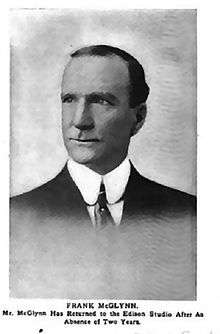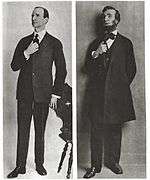Frank McGlynn Sr.
| Frank McGlynn Sr. | |
|---|---|
 McGlynn photo from The Moving Picture World (1913) | |
| Born |
October 26, 1866 San Francisco, California, U.S. |
| Died |
May 18, 1951 (aged 84) Newburgh, New York, U.S. |
| Resting place | Forest Lawn Memorial Park Cemetery |
| Occupation | Actor |
| Years active | 1911-1947 (film) |
| Spouse(s) | Rose (née Sheridan) McGlynn |
| Children | Helen, Virginia Rose, Mary Rose, Rev. Thomas McGlynn, Frank Jr. |
Frank McGlynn Sr. (October 26, 1866 – May 18, 1951) was an American stage and film actor who found success later in life playing Abraham Lincoln.
Early life
McGlynn was born in San Francisco[1] the eldest of two daughters and a son raised by Frank and Mary McGlynn. Census records indicate that McGlynn lost a younger brother (George b. 1869) sometime between 1870 and 1880.[2] His father was second generation Irish from New York who supported his family as a carpenter and later working in real estate. McGlynn’s mother was born in Australia of Irish parents who brought her to America at about the time of the California Gold Rush.[3]
Originally McGlynn studied to be a lawyer. He received his law degree from the University of California, Hastings College of the Law, and was admitted to the bar in 1894. By 1896, though, he was appearing on stage at the Casino Theatre, performing in The Gold Bug, a burlesque musical comedy written by Glen MacDonough with music from Victor Herbert.[4]
Career

Later that year McGlynn toured in a road production of Under the Red Robe, a story based on the Stanley Weyman novel that was adapted for the stage by Edward Everett Rose. Over the following two decades McGlynn played mostly supporting roles with stock companies and in early silent films.
McGlynn’s big break came in 1919, when at the age of fifty-three, the six –foot, four-inch actor was given the opportunity to play the lead in John Drinkwater’s play Abraham Lincoln.[5] The play had a run of 193 performances at the Cort Theatre in New York and played on the road for well over two years. In 1924, McGlynn appeared in a two-reel short film made by Lee DeForest and J. Searle Dawley in DeForest's Phonofilm sound-on-film process, in an excerpt of the play.[6]
McGlynn went on to play in seven Broadway plays; his last as Johnnie, in Frankie and Johnnie at the Theatre Republic in 1930.[7] McGlynn’s 1919 performance as Lincoln also rejuvenated his film career which lasted into the late 1940s.[8][9] He portrayed Lincoln in ten films and in one film an actor who plays Lincoln.
Death
McGlynn died at the age of eighty-four on May 18, 1951 at his daughter’s residence in Newburg, New York. He was survived by three daughters, Helen, Virginia Rose, Mary Rose and a son, Rev. Thomas McGlynn. His wife, Rose (née Sheridan) McGlynn and son Frank Jr. (also an actor), preceded him in death.[10] He is interred in Glendale's Forest Lawn Memorial Park Cemetery.
Selected filmography
- Who Will Marry Mary? (1913)
- The Girl of the Gypsy Camp (1915)
- The Argyle Case (1917)
- The Poor Little Rich Girl (1917)
- Rough and Ready (1918)
- America (1924) as Patrick Henry
- Abraham Lincoln (1924) as Lincoln in short film made in Phonofilm process
- Lady and Gent (1932)
- The Littlest Rebel (1935) as Lincoln
- The Prisoner of Shark Island (1936) as Lincoln
- Hearts in Bondage (1936) as Lincoln
- Wells Fargo (1937) as Lincoln
- The Great Barrier (1937)
- The Lone Ranger (1938) as Lincoln
- Boom Town (1940) as Deacon
References
- ↑ Frank McGlynn, 84, Lincoln on Stage - New York Times May 19, 1951; pg 12
- ↑ 1870-1880 US Census Records
- ↑ 1900 US Census
- ↑ This Week's New Bills - New York Times – September 13, 1896; pg. 18
- ↑ American Magazine: Volume 89 - 1920 - Pg. 34
- ↑ Lee de Forest and Phonofilm at Virtual Broadway website
- ↑ Frank McGlynn IBDB.com
- ↑ Frank McGlynn IMDb.com
- ↑ Frank McGlynn, 84, Lincoln on Stage New York Times - May 19, 1951 - pg. 12
- ↑ Frank McGlynn, 84, Lincoln on Stage New York Times - May 19, 1951 - pg. 12
External links
- Frank McGlynn Sr. at the Internet Movie Database
- Frank McGlynn Sr. at the Internet Broadway Database
